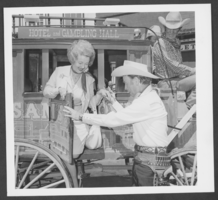Search the Special Collections and Archives Portal
Search Results

Mayra Salinas-Menjivar oral history interview: transcript
Date
Archival Collection
Description
Oral history interview with Mayra Salinas-Menjivar conducted by Nathalie Martinez, Elsa Lopez, and Barbara Tabach on September 20, 2019 for the Latinx Voices of Southern Nevada Oral History Project. Mayra Salinas-Menjivar is a lawyer in Southern Nevada and a graduate of William S. Boyd School of Law. She grew up in Las Vegas but describes her early years living with her maternal grandparents in El Salvador. She describes some of the aftermath she experienced regarding the Civil War in El Salvador, and recounts some testimony told to her by her mother about that particular time period. She details the differences in immigrating in the 1990s and speaks about being an undocumented student. While pursuing a business degree at UNLV she found herself working at a law firm which is where she first decided to pursue law as a career after graduation. She talks about her experiences during law school and her time helping with the law school's immigration clinic. Subjects discussed include: Salvadorian Civil War, Immigration Law, Education, DACA, William S. Boyd Law School.
Text
Las Vegas A.A.A. ribbon cutting, 1968 April 22
Level of Description
Archival Collection
Collection Name: Frank Mitrani Photographs
Box/Folder: Box 12
Archival Component
Tina and So Lin Kwan oral history interview
Identifier
Abstract
Oral history interview with Tina and So Lin Kwan conducted by Cecilia Winchell and Stefani Evans on November 6, 2021 for Reflections: The Las Vegas Asian American and Pacific Islander Oral History Project.
Tina Kwan and her mother, So Lin, discuss their family's history within Guangzhou, China and the United States. So Lin shares how her siblings immigrated to the United States and sponsored the rest of their family to join them in Las Vegas. Tina, So Lin's daughter, discusses her educational career pursuing medicine with degrees from the University of Nevada, Reno; the University of Arizona; and with a fellowship at Arkansas Children's Hospital before joining Children's Heart Center Nevada where she is a pediatric cardiologist. Tina and So Lin talk about the Kwan's restaurant, the Fortune Inn Restaurant, which was open for 15 years and closed in 2005. They also discuss Chinese superstitions and customs, diversity within Southern Nevada, anti-Asian discrimination, and learning English as a second language.
Archival Collection

Photograph of Roy Rogers, Las Vegas, August 22, 1980
Date
Archival Collection
Description
Image
Cook, Jim, Bank of Las Vegas, 1969 July 22
Level of Description
Archival Collection
Collection Name: Frank Mitrani Photographs
Box/Folder: Box 21
Archival Component
Benson, James, Bank of Las Vegas, 1969 July 22
Level of Description
Archival Collection
Collection Name: Frank Mitrani Photographs
Box/Folder: Box 21
Archival Component
The Changing Face of Las Vegas-KTTV, 1990 January 22
Level of Description
Archival Collection
Collection Name: MGM Mirage Corporation Records
Box/Folder: Box 39, Digital File 00
Archival Component

Amanda "Alex" Aikens oral history interview: transcript
Date
Archival Collection
Description
Oral history interview with Amanda "Alex" Aikens conducted by Barbara Tabach on December 28, 2017 for the Remembering 1 October Oral History Project. In this interview, Aikens discusses the support she provided for the community after the October 1, 2017 shooting in Las Vegas, Nevada along with the event at First Friday that she organized to provide counseling services for those in need. She describes her usage of Facebook as a social media platform to keep the community posted on the shooting as well as any advice and resources for those who wanted to help. Aikens expands upon her realization that people felt the need to contribute and discusses her efforts to gather a group of therapy volunteers that eventually grew so large an event space was needed. In addition to the volunteers who provided counseling and other event functions, she mentions a few of the companies that made the event possible with a donation of resources, such as First Friday that offered room space and a nearby office that supplied furniture.
Text
Members of Temple Beth Sholom oral history roundtable
Identifier
Abstract
Oral history roundtable with members of Temple Beth Sholom conducted by Barbara Tabach on January 14, 2015 for the Southern Nevada Jewish Heritage Project. Sandy Mallin, past president of Temple Beth Sholom, leads a group of past leaders of the earliest Jewish synagogue (founded in 1946) in a discussion reminiscing on the temple’s beginning and growth as the Jewish population of Las Vegas, Nevada grew.
Archival Collection

Amy Bush Herzer oral history interview: transcript
Date
Archival Collection
Description
Oral history interview with Amy Bush Herzer conducted by Barbara Tabach on November 14, 2019 for the Remembering 1 October Oral History Project. Herzer begins the interview discussing her early life, education, and her current job as the University of Nevada, Las Vegas (UNLV) women's golf coach. She speaks about her family's history with golf, her personal history, and life with her husband, Kendall Herzer. After, she recalls where she was on the day of the October 1 shooting, and how she found out about the event, and recalls her husband reported to the main fire station as an Emergency Manager for the State of Nevada. She recalls keeping track of her athletes' whereabouts and letting their families know. Herzer describes how people reacted when she had brought a therapy dog, Apollo, in for the people donating blood and how the community came together to support each other and share resources as a community.
Text
